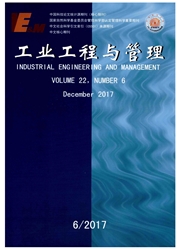

 中文摘要:
中文摘要:
为分析供应链运作机制对降低产能不确定和需求不确定的影响,对比研究了MOI和VMI两种供应链运作模式下单关键零部件供应商一单制造商组成的两级供应链系统。MOI模式下,制造商负责产品的库存决策,并承担相应的零部件库存成本和缺货成本;VMI模式下,供应商负责产品的库存决策和额外产能储备决策,并承担相应的零部件库存成本和过剩能力闲置成本。给出了供应链的最优解及期望利润;为进一步讨论供应链管理模式对提升供应链运作效率的管理意义,分析了随机需求、随机产能及批发价格对两种模式的影响。
 英文摘要:
英文摘要:
To analyze the effects of operation mode of supply chain on supply chain performance under uncertain capacity and uncertain demand, a decentralized supply chain consisting of one supplier (providing key component) and one manufacturer under Manufacture Owned Inventory (MOI) and Vendor Managed Inventory (VMI) is studied. Under MOI, the manufacturer is fully responsible for the inventory decision of product, and bears component inventory cost and product shortage cost. Under VMI, the supplier is fully responsible for decisions of extra capacity and product inventory, and bears component inventory cost and idle capacity cost. Optimal decisions and expected supply chain profit under MOI and VMI are put forwards. To identify managerial insights that how supply chain arrangement improves supply chain efficiency, we investigate the effects of demand uncertainty, capacity uncertainty, and component wholesale price,on the behavior under MOI and VMI.
 同期刊论文项目
同期刊论文项目
 同项目期刊论文
同项目期刊论文
 期刊信息
期刊信息
